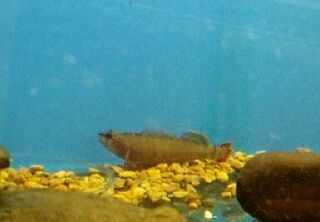
The yellowcheek darter is a species of freshwater ray-finned fish, a darter from the subfamily Etheostomatinae, part of the family Percidae, which also contains the perches, ruffes and pikeperches. It is endemic to the eastern United States where it is only known to occur in the state of Arkansas in the Little Red River. It inhabits medium-sized and smaller rivers in rocky riffles with strong current. This species can reach a length of 7.2 centimetres (2.8 in) TL though most only reach about 4.9 centimetres (1.9 in).

Lampsilis higginsii is a rare species of freshwater mussel known as Higgins' eye pearly mussel or simply Higgins' eye. It is endemic to the United States, where it occurs in the upper Mississippi River and the drainages of some of its tributaries. It is threatened by the introduced zebra mussel. Lapsilis higginsii is a federally listed endangered species.
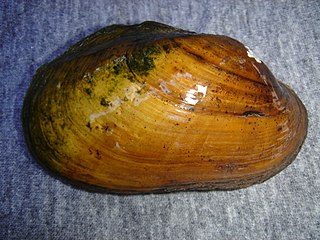
Lampsilis powellii is a rare species of freshwater mussel known by the common name Arkansas fatmucket. It is endemic to Arkansas in the United States, where it occurs in the Ouachita, Saline, and Caddo River systems. It is one of two mussels endemic to Arksansas, the other being speckled pocketbook. It is a federally listed threatened species of the United States.
Lampsilis rafinesqueana, the Neosho mucket or Neosho pearly mussel, is a species of North American freshwater mussel endemic to Arkansas, Oklahoma, Illinois, Missouri and Kansas.
Lampsilis streckeri, the speckled pocketbook, is a species of freshwater mussel in the family Unionidae, the river mussels. It is endemic to Arkansas in the United States, where it is threatened by habitat loss. It is a federally listed endangered species of the United States.
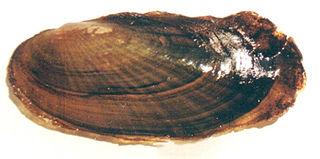
Leptodea leptodon, the scaleshell mussel or scale shell, is a species of freshwater mussel in the family Unionidae, the river mussels. This aquatic bivalve mollusk has disappeared from much of its historical range. It is endemic to the United States, where it is now present in four or fewer states; it is only found with any regularity in Missouri. It is a federally listed endangered species of the United States.

The Louisiana pearlshell, Margaritifera hembeli, is a rare species of bivalve mollusk in the family Margaritiferidae. This freshwater mussel is native to Louisiana in the United States, and was previously present also in Arkansas. It grows to a length of about 10 cm (4 in) and lives on the sand or gravel stream-bed in riffles and fast flowing stretches of small streams. Its life cycle involves a stage where it lives parasitically inside a fish. This mollusk is sensitive to increased sedimentation and cannot tolerate impoundments. Because of its limited range and its population decline, the International Union for Conservation of Nature has rated this mollusk as being "critically endangered".
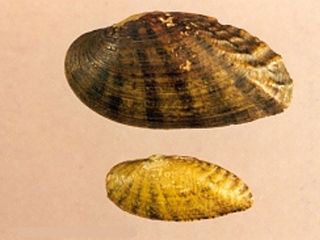
Medionidus acutissimus, the Alabama moccasinshell, is a species of freshwater mussel in the family Unionidae, the river mussels. It is native to Alabama, Mississippi, Georgia, Tennessee, and possibly Florida. It is a federally listed threatened species of the United States.
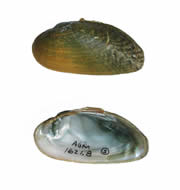
Medionidus parvulus, the Coosa moccasinshell, is a rare species of freshwater mussel in the family Unionidae, the river mussels. This aquatic bivalve mollusk is native to Georgia and Tennessee in the United States, and has been extirpated from the state of Alabama. It is a federally listed endangered species of the United States.

Obovaria retusa is a rare species of freshwater mussel in the family Unionidae, the river mussels. Its common names include golf stick pearly mussel

Pegias is a monotypic genus of freshwater mussels in the family Unionidae. This genus contains the single species Pegias fabula, known commonly as the littlewing pearlymussel.
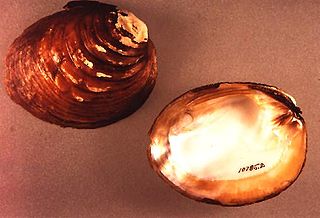
Plethobasus cicatricosus, the white warty-back pearly mussel or white wartyback, is a species of freshwater mussel in the family Unionidae, the river mussels. Once widely distributed in the Ohio, Cumberland, and Tennessee River systems in the United States, its range has declined dramatically to the point of near-extinction. It is a federally listed endangered species of the United States.
The rough hornsnail, scientific name Pleurocera foremani, is a rare species of freshwater snail with an operculum, an aquatic gastropod mollusk in the family Pleuroceridae.

Potamilus capax, the fat pocketbook pearly mussel or fat pocketbook, is a species of freshwater mussel, an aquatic bivalve mollusk in the family Unionidae, the river mussels.
The triangular kidneyshell is a species of freshwater mussel, in the family Unionidae, the river mussels. It is endemic to Alabama in the United States, where it is known from several rivers and streams in the Mobile River Basin. It is a federally listed endangered species of the United States.

The winged mapleleaf, also known as false mapleleaf, or hickory nut shell, and with the scientific name Quadrula fragosa, is a species of freshwater mussel. It is an aquatic bivalve mollusk in the family Unionidae, the river mussels. It is endemic to the United States.

Theliderma intermedia, the Cumberland monkeyface pearly mussel or Cumberland monkeyface, is a species of freshwater mussel in the family Unionidae, the river mussels. This aquatic bivalve mollusk is native to Tennessee and Virginia in the United States. Historically widespread in the upper Tennessee River system, it populations have been reduced by habitat destruction and pollution. It now only occurs in two tributaries: the Duck and Powell Rivers. It is a federally listed endangered species.
Sanders Creek is a 23-mile-long (37 km) waterway in Lamar County, Texas, United States, near Paris, Texas. It is a tributary of the Red River.

Arcidens confragosus is a species of freshwater mussels in the family Unionidae, the river mussels. It is commonly known as the rock pocketbook, but also has many other common names: bastard, black pocketbook, grandmaw, queen, and rockshell.
















